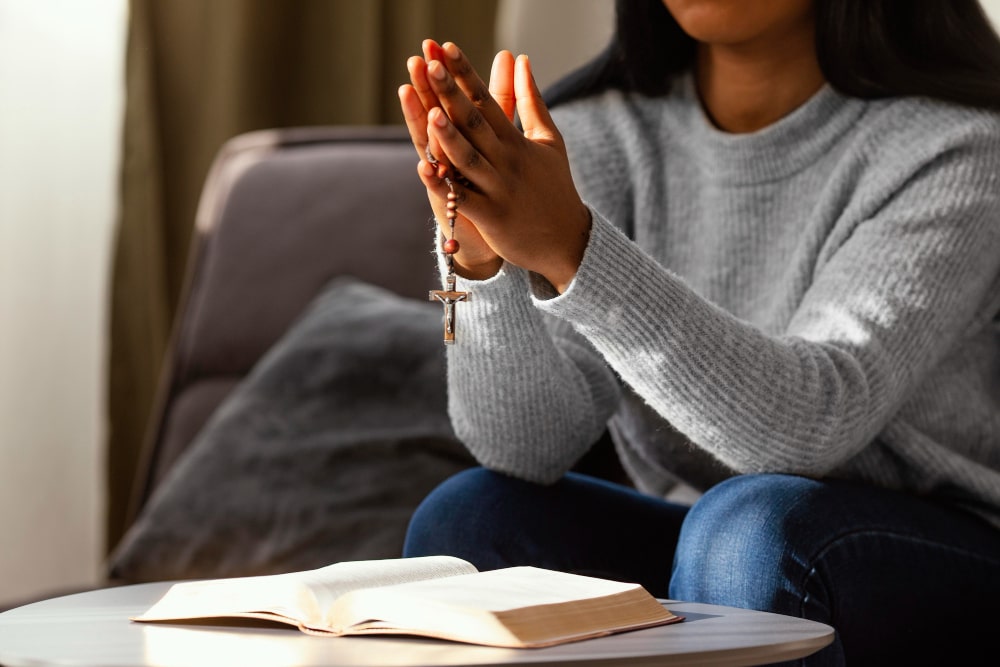Prayer is a powerful and essential aspect of our spiritual life. It is a means of communication with God, and it allows us to develop a deeper relationship with Him. When we improve our prayer life, we open ourselves up to receive blessings, guidance, and strength from God.
But many of us struggle with consistency and focus in our prayers, which can hinder our spiritual growth. So today you’ll learn 10 effective ways to improve your prayer life and take your spiritual journey to the next level. These tips are not just for beginners, but for anyone who wants to deepen their connection with God through prayer.
More Reading: 7 Types of Prayer in the Bible: A Guide for Christians
8 Effective Ways to Improve Your Prayer Life
1. Establish a Set Time and Place


One of the first steps to improving your prayer life is to establish a set time and place for your prayers. This will help you to be consistent and make prayer a regular part of your daily routine. Choose a time and place where you can be free from distractions and have a peaceful environment to pray in. This will allow you to focus and connect with God more deeply. Some people prefer to pray early in the morning, before starting their day, while others find it helpful to pray at night before going to sleep.
You can also choose a specific place in your home or outside where you feel most comfortable praying. It could be a quiet corner, a garden, or even a designated prayer room if you have one. The important thing is to find a time and place that works best for you and stick to it.
2. Set a Prayer Intention


Before you begin your prayer, it is helpful to set an intention for what you want to pray about. This could be anything from asking for guidance, expressing gratitude, or praying for the needs of others. Having a clear intention will help you stay focused during your prayer and give it more meaning and purpose.
When setting your intention, it is important to be specific and sincere in what you are asking for. This will help you connect with the divine and open yourself up to receiving spiritual guidance and blessings. Here are some steps you can take to set a prayer intention:
- Reflect on what is weighing on your heart or mind and what you truly need from your divine connection.
- Write down your intention in a journal or on a piece of paper, using clear and concise language.
- Visualize yourself receiving the answer to your prayer and feeling grateful for it.
- Take a few deep breaths and release any doubts or distractions, focusing solely on your intention.
3. Use Scripture or Prayers as Guidance


If you struggle with finding the right words to pray, using scripture or pre-written prayers can be a helpful guide. You can search for verses or prayers that resonate with your current situation or intention and use them as a starting point for your own prayer. This will not only help you stay focused, but it will also deepen your understanding of the scriptures and strengthen your faith.
Prayers from religious texts such as the Bible, Quran, or Bhagavad Gita are a great source of inspiration and guidance. You can also use prayer books or apps (such as the Pray.com app) that provide daily prayers for different situations. Experiment with different prayers and see which ones resonate with you the most.
4. Practice Gratitude


Practicing gratitude is an essential aspect of improving your prayer life. When we express gratitude, we are acknowledging God’s goodness and giving thanks for all that He has provided us with. This creates a positive mindset and opens us up to receive even more blessings.
You can start by simply listing out things that you are grateful for in your life during your prayer. It could be anything from having a roof over your head, food on the table, or good health. As you continue to practice gratitude, you will find yourself becoming more aware of the blessings in your life, no matter how big or small they may be.
Many experts suggest keeping a gratitude journal to jot down daily blessings. This can also be incorporated into your prayer routine, allowing you to express your gratitude directly to God.
5. Meditate


Incorporating meditation into your prayer routine can greatly enhance your spiritual connection with God. Meditation helps to quiet the mind and allows us to become more present and open to our prayers. You can start by simply focusing on your breath or using a guided meditation that aligns with your prayer intention.
The practice of meditation helps to reduce stress, increase mindfulness, and deepen our spiritual awareness. It can also help us let go of any distractions or negative thoughts that may hinder our prayers.
When we are able to quiet our minds and be fully present in the moment, our prayers become more heartfelt and sincere. Yes, it can be challenging at first, but with consistent practice, meditation and prayer can become a powerful combination in our spiritual journey.
May Also Need: 7 Simple Meditation Techniques for Beginners
6. Engage All Your Senses


Prayer doesn’t have to be limited to just words. Engaging all our senses during prayer can add a new level of depth and meaning to our connection with God. You can light candles, burn incense, or use essential oils that hold spiritual significance for you.
You can also play soft music or chant mantras that help you to feel more connected with the divine. These sensory experiences can help to calm the mind and create a sacred atmosphere for your prayers.
7. Pray with Others


Praying with others can be a transformative experience for our spiritual growth. Whether it’s with your family, friends, or in a religious community, coming together to pray creates a sense of unity and support. It also allows us to learn from each other and share our intentions and struggles, strengthening our faith and connection with God.
If you don’t have anyone to pray with in person, there are online prayer communities that you can join. This is especially helpful during times when we may not be able to physically come together for prayer.
8. Be Patient and Persistent


Improving your prayer life takes time and consistency. It may not always feel like your prayers are being answered, but it’s important to be patient and persistent in your practice. Keep showing up and putting in the effort, even when the results aren’t immediate. Have faith that God is listening and orchestrating events behind the scenes.
Remember that prayer isn’t just about asking for things, but also about building a deeper connection with God. Keep an open heart and mind during your prayer, and trust that everything will unfold according to His plan. And most importantly, have faith that your prayers will be answered at the right time and in the best way possible.
Please don’t get discouraged if you don’t see immediate changes in your life. Sometimes, God’s timing and plans differ from our own. But know that He is always listening and working for our greater good. Keep your intentions pure and your faith strong, and you will see the power of prayer in your life.
How has my journey with Prayer been?


Now I would like to share a brief story of how improving my prayer life has personally helped me. A few years ago, I was going through a difficult time in my life and felt lost and alone. I turned to prayer as a last resort, not knowing what else to do.
However, as I began consistently practicing the tips mentioned above, I noticed a gradual shift in my mindset and overall well-being. My prayers became more meaningful and sincere, and I started feeling a sense of peace and comfort that had been missing before.
The Impact of Consistent Prayer
Through prayer, I was able to let go of my worries and trust that everything would work out for the best. And it did. Things didn’t magically become perfect overnight, but I was able to handle my struggles with a newfound strength and faith that I attribute to prayer. It has become an integral part of my daily routine, and I continue to see its positive effects in all aspects of my life.
An Invitation to Improve Your Prayer Life
I hope this journey inspires you to improve your own prayer life and experience the power of prayer for yourself. Remember, there is no right or wrong way to pray; it’s a personal connection between you and God.
Keep an open heart, be patient, and trust in His divine plan for your life. May your prayers bring you closer to Him and bring peace, love, and blessings into your life. So keep praying and never stop believing in the power of prayer.
My Final Words
I would like to end by saying that prayer is a beautiful and powerful tool for spiritual growth and connection. It possesses the ability to transform our lives and draw us closer to God. Don’t hesitate to explore various techniques and discover what suits you best.
And most importantly, always approach prayer with sincerity, gratitude, and love in your heart. May your prayers guide you on your journey towards inner peace and fulfillment.
Read More: Spiritual Awakening Stages: A Complete Guide for Your Journey
Frequently Asked Questions (FAQs)
How can I establish a more consistent prayer routine?
Consistency in your prayer routine can be achieved by setting a specific time and place for your prayers each day. Creating a ritual around your prayer time, such as lighting a candle or playing calming music, can also help signal to your mind that it’s time to pray. Additionally, keeping a prayer journal can help you stay focused and track your progress over time.
What should I do if I don’t experience any feelings during prayer?
It’s normal to sometimes feel like your prayers lack emotional depth or connection. It might help to try different forms of prayer, such as meditation, guided prayers, or praying with others to find what resonates with you.
Remember that developing a deeper connection with God takes time and practice. Be patient with yourself and trust that you will feel the presence of God more strongly as you continue your journey.
Can I pray even if I’m not religious or belong to a different faith?
Absolutely. Prayer is a personal and spiritual practice that can be adapted to suit your individual beliefs and needs. Regardless of whether you identify with a specific religion or not, you can find comfort and guidance in prayer. Focus on the aspects that resonate with you, such as gratitude, mindfulness, or simply expressing your thoughts and feelings to a higher power.
What steps should I take if I feel my prayers are unanswered?
It can be disheartening to feel like your prayers are going unanswered. Remember that sometimes the answers to our prayers may come in forms we don’t expect or at times we don’t anticipate.
Keep an open mind and pay attention to the subtle ways in which God might be working in your life. Maintain faith, be patient, and continue to trust in His plan, knowing that your prayers are being heard even if the outcomes aren’t immediately visible.
